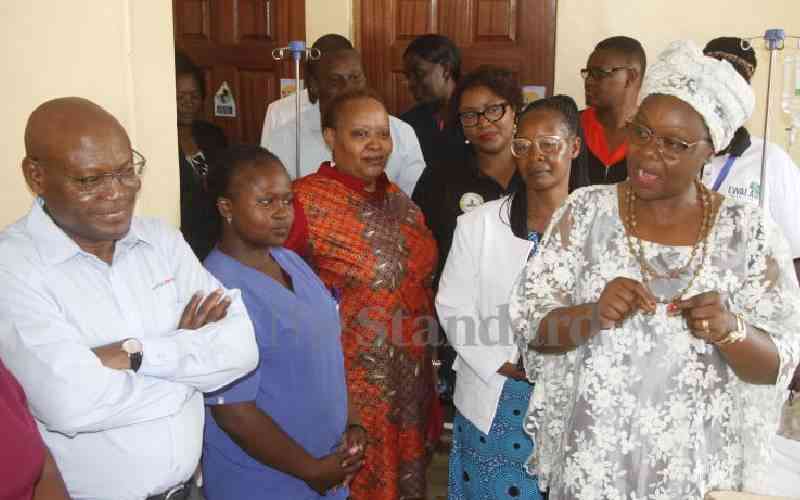
When Jesca Menge, a mother of five walked into a health facility in Migori to deliver her sixth child three years ago, she was optimistic that the process would be seamless and within hours she would be holding her new bundle of joy.
She was in an upbeat mood despite the labour pains and was looking forward to a successful delivery. She experienced intense labour pains and was transferred to another facility where she was taken through a Caesarean section (CS).
The exercise marked the first start of her struggle with obstetric fistula, a condition that causes constant leakage of urine, faeces, and blood. Unfortunately for her, she also lost the baby.
For a month after the delivery, Menge says she had difficulty controlling urine and stool.
Menge visited a health facility where she sought for treatment, but the cost was too high and she could not afford it.
She says she was emitting a foul smell despite her cleaning herself more than three times a day.
The young mother who still loved going to social gatherings was now forced to stay at home as nobody wanted to associate with her.
- New research reveals lasting physical, mental scars of FGM
- Help children understand periods
- Kenya to host Africa women in STEM summit amid gender gap push
- After the trauma, finding pathways to healing
Keep Reading
"It has been a difficult journey since I started having the condition. I have been ostracised within society because of the smell," she says.
All that trauma and suffering is now in the past after she underwent a successful free fistula surgery camp at Migori County Referral Hospital courtesy of a group of volunteers.
For Jackline Awuor who hails from Kanyimach village in Rongo Sub-County, she says that after giving birth to her third child last year, she could not hold urine.
Her case happened as a result of prolonged labour which left her with damaged tissues between the bladder and vagina.
She says her social circle reduced and she only remained with a few friends and family who understood her situation.
"I tried to manage it with the few available materials I could afford but the smell could not go away," Awour narrates.
She would buy adult diapers to help her or use cotton pads and clean up often during the day to reduce the smell that came from the urine leakage.
During the free fistula surgery camp campaign, she was visited by Migori First Lady Agnes Ayacko.
"I was at a shop and was about to go to the farm when I was told that the governor's wife wanted to see me," she says adding that she was unaware for the reason of the visit until it was disclosed to her that it was about her condition.
Menge and Awuor are among 85 women who by March 1 had undergone corrective surgery at Migori County Referral Hospital in a medical camp that was organised by AMREF, Flying Doctors Society, Safaricom Foundation and Migori County Government.
The patients had been taken through a counselling session before the surgery.
Data from the Ministry of Health shows that more than 1,000 new cases of fistula are recorded in Kenya every year.
Migori Governor Ochilo Ayacko who thanked the donors, well-wishers and the county medical team who volunteered for the fistula treatment says many women who suffer from the disease are unable to get the condition sorted because of the high cost of treatment.
For the testing for fistula alone, a patient has to part with about Sh3,000 while the cost of plastic surgery is over Sh300,000.
"We need to end the stigma which surrounds fistula and make sure our women do not live in stigma and fear; they should be encouraged to come out and seek treatment," said Ayacko.
The exercise which started on February 24 targets more than 3,000 women annually across the country.
M-Pesa Foundation chairman Joe Ogutu says they are making efforts to bring the number of Kenyan women who suffer from fistula down.
"Women suffering from fistula should not be uncomfortable within the society, corrective surgery has ensured they can live with dignity," Ogutu states.
Martha Wariithi who is a trustee at Flying Doctors and Migori First Lady Agnes Ayacko reiterated that with much effort the condition could be eradicated.
"Women who have been treated will be able to live with dignity among the society and their families have been given hope," Mrs Ayacko said, adding that they will work closely to ensure women are able to give birth in hospitals and safe places and are insured by government-funded schemes.
Beatrice Ogutu, a fistula nurse at Kenyatta Hospital says most of the conditions they came across were birth related.
She explains that a woman with obstructed labour can suffer labour pain for up to seven days.
"This means that a hole forms on the vaginal wall between the urinary tract and her rectum. The urine and faeces thus start to leak from the vaginal opening causing soiling and foul smell," she explains. Apart from labour, she says, hysterectomies that damage the vaginal wall can also cause such types of fistulas.
 The Standard Group Plc is a multi-media organization with investments in media
platforms spanning newspaper print
operations, television, radio broadcasting, digital and online services. The
Standard Group is recognized as a
leading multi-media house in Kenya with a key influence in matters of national
and international interest.
The Standard Group Plc is a multi-media organization with investments in media
platforms spanning newspaper print
operations, television, radio broadcasting, digital and online services. The
Standard Group is recognized as a
leading multi-media house in Kenya with a key influence in matters of national
and international interest.











